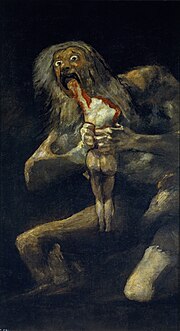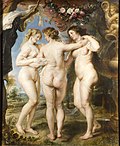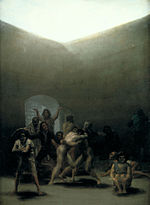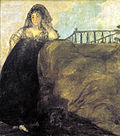Allegory of Industry is a tondo painted by Francisco de Goya (c. 1805) which was one of the four paintings from a series of allegories about scientific...
4 KB (452 words) - 02:45, 23 September 2024
Saturn Devouring His Son (redirect from Saturn Devouring One of His Sons)
meaning of the picture have been offered: the conflict between youth and old age, time as the devourer of all things, the wrath of God and an allegory of the...
16 KB (1,842 words) - 18:55, 17 November 2024
Goya y Lucientes (1746–1828) was a Spanish artist, now viewed as one of the leaders of the artistic movement Romanticism. He produced around 700 paintings...
168 KB (354 words) - 23:50, 16 October 2024
The Dog (Goya) (category Paintings of dogs)
Prado, Madrid. It shows the head of a dog gazing upwards. The dog itself is almost lost in the vastness of the rest of the image, which is empty except...
12 KB (1,282 words) - 16:50, 6 November 2024
Black Paintings (redirect from Procession of the holy office)
Pinturas negras) is the name given to a group of 14 paintings by Francisco Goya from the later years of his life, likely between 1819 and 1823. They portray...
23 KB (2,555 words) - 00:25, 25 September 2024
The Third of May 1808 in Madrid (also known as El tres de mayo de 1808 en Madrid or Los fusilamientos de la montaña del Príncipe Pío, or Los fusilamientos...
40 KB (5,000 words) - 17:28, 23 September 2024
The Second of May 1808, by Goya, also known as The Charge of the Mamelukes (Spanish: El 2 de mayo de 1808 en Madrid, La lucha con los mamelucos or La...
5 KB (557 words) - 04:09, 25 October 2024
La maja desnuda (category Paintings of women)
the Museo del Prado in Madrid. It portrays a nude woman reclining on a bed of pillows, and was probably commissioned by Manuel de Godoy, to hang in his...
11 KB (1,362 words) - 19:50, 11 November 2024
of yet another figure hovering in the vicinity. According to Fraenger, the eroticism of the center frame could be considered either as an allegory of...
70 KB (9,096 words) - 22:34, 20 November 2024
Francisco Goya (redirect from Apparition of the Virgin of the Pillar to Saint James and his Saragossan disciples)
painter and printmaker. He is considered the most important Spanish artist of the late 18th and early 19th centuries. His paintings, drawings, and engravings...
50 KB (5,935 words) - 17:18, 14 November 2024
motion echoing the curve of the crescent moon. Goya used the imagery of covens of witches in a number of works, most notably in one of his Black Paintings...
6 KB (710 words) - 03:48, 25 October 2024
painter Francisco Goya. It was part of a series of six paintings related to witchcraft acquired by the Duke and Duchess of Osuna in 1798. It has been described...
9 KB (728 words) - 18:54, 31 October 2024
La maja vestida (category Portraits of women)
is a clothed version of the earlier La maja desnuda, which was created between 1795 and 1800. The identity of the model and that of the commissioner have...
5 KB (513 words) - 01:55, 23 September 2024
(Spanish: Dos viejos comiendo sopa) or Two Witches (Spanish: Dos Brujas) is one of the fourteen Black Paintings created by Francisco Goya between 1819 and 1823...
3 KB (355 words) - 08:33, 13 November 2024
essays on the education of a prince. The allegory referred to the Greek myth of Cadmus and the dragon's teeth. By the instructions of Athena, Cadmus sowed...
6 KB (608 words) - 06:54, 25 October 2024
The Three Graces (Rubens, Madrid) (category Paintings of the Three Graces)
Three Graces is an oil painting of the Three Graces by Peter Paul Rubens. The painting was held in the personal collection of the artist until his death,...
2 KB (119 words) - 00:03, 7 May 2024
The Triumph of Death is an oil panel painting by Pieter Bruegel the Elder painted c. 1562. It has been in the Museo del Prado in Madrid since 1827. The...
11 KB (1,422 words) - 15:10, 22 November 2024
bouts of an unidentified illness. The works were rendered directly onto the interior walls of the house known as Quinta del Sordo ("The House of the Deaf...
12 KB (1,611 words) - 21:53, 18 October 2024
It evokes themes of violence, intimidation, ageing and death; Satan hulks in the form of a goat in moonlit silhouette over a coven of terrified old witches...
22 KB (2,836 words) - 18:55, 12 November 2024
Atropos (Goya) (category Paintings of Greek myths)
distaff (which Goya replaces with a doll or newborn child, possibly an allegory of life), and Lachesis, the spinning one, which in this representation looks...
5 KB (547 words) - 22:45, 25 September 2024
Mona Lisa (Prado) (redirect from Mona Lisa of the Prado)
The Prado Mona Lisa is a painting by the workshop of Leonardo da Vinci and depicts the same subject and composition as Leonardo's better known Mona Lisa...
13 KB (1,369 words) - 02:39, 5 September 2024
Pilgrimage to the Fountain of San Isidro or The Holy Office (Spanish: Peregrinación a la fuente de San Isidro or El Santo Official) are names given to...
3 KB (274 words) - 00:51, 28 October 2024
commissioned for the oratory of the court of Elisabeth of France, queen consort to Philip IV of Spain, in the Real Alcázar of Madrid. There it joined others...
4 KB (547 words) - 15:21, 2 August 2024
noblemen, this work is one of a dozen small-scale, dark images he produced independently. Uncommissioned, it was one of the first of Goya's mid-1790s cabinet...
8 KB (1,002 words) - 23:25, 22 September 2024
Quinta del Sordo (category History of Madrid)
(English: Villa of the Deaf One), or Quinta de Goya, was an extensive estate and country house situated on a hill in the old municipality of Carabanchel on...
5 KB (515 words) - 19:06, 20 November 2024
Cutting the Stone, also called The Extraction of the Stone of Madness or The Cure of Folly, is an oil-on-panel painting completed c.1494 or later by the...
4 KB (402 words) - 19:15, 12 November 2024
The Seven Deadly Sins and the Four Last Things (category Paintings of Jesus)
than allegorical representations of the sins. At the centre of the large circle, which is said to represent the eye of God, is a "pupil" in which Christ...
13 KB (1,519 words) - 19:32, 1 November 2024
La Leocadia (category Portraits of women)
artist Francisco Goya, completed sometime between 1819–1823, as one of his series of 14 Black Paintings. It shows Leocadia Weiss, his maid and likely his...
9 KB (1,269 words) - 00:38, 9 November 2024
Los Caprichos (The Caprices) is a set of 80 prints in aquatint and etching created by the Spanish artist Francisco Goya in 1797–1798 and published as an...
77 KB (9,787 words) - 03:39, 18 November 2024
Charles IV of Spain and His Family is an oil-on-canvas group portrait painting by the Spanish artist Francisco Goya. He began work on the painting in 1800...
11 KB (1,288 words) - 22:56, 23 September 2024




























